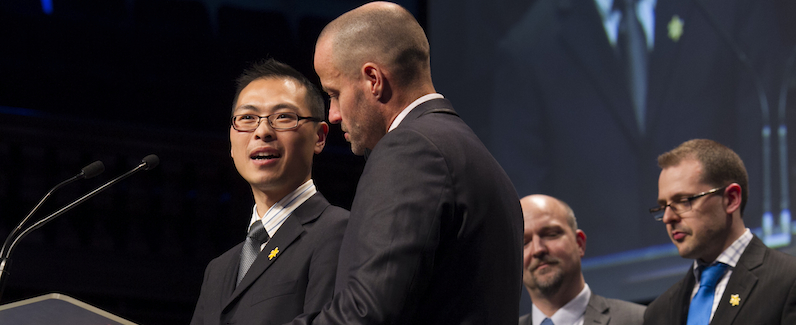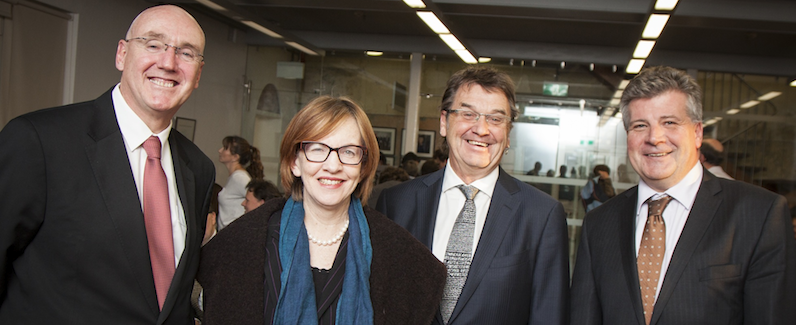Alveo, the virtual laboratory for human communication science is launched
Launching Alveo, from L to R: Professor Barney Glover, Professor Mary O’Kane, Professor Denis Burnham and Professor Scott Holmes.
NSW Chief Scientist & Engineer, Professor Mary O’Kane and Vice-Chancellor of UWS, Professor Barney Glover have launched Alveo, the multi-institutional virtual laboratory for human communication science at UWS.
The Intersect-developed Alveo provides online infrastructure for accessing human communication data sets including speech, texts, music and video. The virtual laboratory provides users access to specialised tools that enables them to search, analyse and annotate this data.
“This is what a data repository should be,” said Professor O’Kane. “When you have the right tools and the right data you can move among them easily, you can bring lots of disciplines together, and the world can be very, very productive indeed. We talk about productivity problems in Australia, this is the answer.”
The Alveo project is led by MARCS Institute researcher Dr Dominique Estival, with the University of Western Sydney as the lead organisation. UWS is in partnership with, and acknowledges funding from, the National eResearch Collaboration Tools and Resources (NeCTAR) project to develop Alveo. NeCTAR is an Australian Government project conducted as part of the Super Science initiative and financed by the Education Investment Fund.
For more information about Alveo, see http://alveo.edu.au
Annual report released
Intersect has moved it’s annual reporting to the calendar year, in line with the academic year.
Our Annual Report 2013 is now available in hard copy (please email enquiries@intersect.org.au), and online at http://www.intersect.org.au/docs/attachments/AnnualReport2013_Final_INTERACTIVE.pdf
Biobanking project delivers
Image courtesy of A/Prof Daniel Catchpoole, Children’s Hospital at Westmead Paediatric Tumour Bank.
Biobanking refers to the practice of collection and storage of tissue samples and biopsies for use in subsequent research projects.
Intersect has been contracted by the Cancer Institute NSW sponsored Biobanking Stakeholders Network (BSN) to undertake a survey and needs analysis of the IT/data exchange and digital image capture and analysis systems in use across cancer-related biobanks in NSW, and to prepare recommendations and strategies for achieving streamlined systems across the entire BSN.
The survey has been prepared:
- on behalf of groups affiliated with two of our member Universities: Prof Rodney Scott (University of Newcastle) and A/Prof Kevin Spring (University of Western Sydney),
- in collaboration with an additional Medical Research group at the Kids Research Institute at the Westmead Children’s Hospital: A/Prof Jennifer Byrne (University of Sydney),
- and with input from both the Cancer Institute NSW and the NSW Department of Health (Office of Health and Medical Research).
Face-to-face interviews were arranged across the whole BSN, which includes approximately 30 research groups that undertake cancer biobanking operations at the University of Sydney, University of New South Wales, University of Newcastle and University of Western Sydney (and their associated Research Hospitals); various Medical Research Institutes across NSW (Kolling Institute, Garvan Institute, Kinghorn Cancer Centre, Centenary Institute, Children’s Cancer Institute, NHMRC Clinical Trials Centre); and the Cancer Council NSW.
The Report and recommendations surrounding the Digital Imaging systems has recently been delivered and very well received by the champions of this project at the Hunter Cancer Research Alliance and the School of Biomedical Sciences and Pharmacy, University of Newcastle. Formal submission to the Cancer Institute NSW BSN will now follow to allow informed discussion of the current state of play and options moving forward at a strategic level which will ultimately help in the BSN’s goals of improving researcher’s access to tissues and data, improving operational efficiencies and building cancer biobanking capacity in NSW that is cost-effective and sustainable.
Infrastructure update
We are still accepting applications for ReDS funded storage. Time is running out for this program as it comes to an end in December this year so we strongly encourage research groups to submit their applications as soon as possible.
Total number of approved collections 67
Number of TBs approved 5.4PB
Number of TBs ingested 856TB
Data update: ANZAC Research Institute
Now hosted on the Intersect storage node, the Anzac’s Research Institute’s steroid homo growth factors on skeletal change data collection is significant for arthritis research as an aid to understanding the way the condition attacks bones. One objective of the research is development of a better understanding of disease drugs such as glucocorticoids. The data explores their impact on bone, how they work and how damage could be prevented to improve patient outcomes and understanding of the disease.
The research dataset has supported research into bone biology, bone cell and molecular biology as related to medical disorders of the bone such as arthritis. The research data indicated that glucocorticoid circulation and intracellular levels are increased with ageing. This increase in each cell type will impact or accelerate the ageing process. For example, the increased glucocorticoid signaling in osteoblasts is highly associated with body weight gain, fat accumulation and diabetes. The data will be very useful to other research groups such as in fuel metabolism or diabetes field. Raw datasets could be used to support additional analyses from other research groups working in this area.
Training campaign: Excel Fu Frenzy
September is the month for an ‘Excel Fu Frenzy’ across our member universities. What is Excel Fu? Well, like ‘Kung Fu’ it can be considered a ‘higher state’ of Excel usage. This new course developed by Intersect is designed specifically for researchers working with their data and covers: importing of data, data cleansing, data manipulation, data interpretation and visualisation within Excel. The course is conducted over one full day of training.
With ’20 courses in 20 days!’ being planned across NSW and ACT there will be plenty of dates and locations from which to choose, see Intersect training page or subscribe to our mailing list to be notified of these courses as they are confirmed.
Regular Training
Intersect will also provide the following training courses in high performance computing and data manipulation:
-5 Aug 2014: Simple tools and techniques for cleaning up humanities data (UWS). Register at https://intersect-1021.eventbrite.com.au/?ref=ebapi.
-5 Aug 2014: Simple tools and techniques for visualising humanities data (UWS). Register at https://intersect-1022.eventbrite.com.au/?ref=ebapi.
-25-26 Aug 2014: CSU – Bathurst Campus – Introduction to UNIX for HPC. Register at https://intersect-1026.eventbrite.com.au/?ref=ebapi.
-28-29 Aug 2014: CSU – Wagga Campus – Introduction to UNIX for HPC. Register at https://intersect-1025.eventbrite.com.au/?ref=ebapi.
-19 Sep 2014: CSU – Excel Fu (Wagga Wagga Campus). Register at https://intersect-1045.eventbrite.com.au/?ref=ebapi.
-22 Sep 2014: CSU – Excel Fu (Albury Campus). Register at https://intersect-1046.eventbrite.com.au/?ref=ebapi.
-10 Oct 2014: SCU – Excel Fu (Lismore Campus). Register at https://intersect-1043.eventbrite.com.au/?ref=ebapi.
PLUS
-15 Aug: ANDS/Intersect Research Data Management Roundtable: Data Curation 2014
New staff
Brad Carter has joined us as a Project Manager. Brad is a graduate of Southern Cross University.


